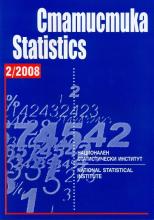National Statistical Institute informs data users that the second volume of Statistics Journal, 2008 is issued. The following articles are included:
Dynamics of the human poverty in Republic of Bulgaria – author Stanka Jekova, Ph. D., Chief assistant at Statistics Department of University of Economics – Varna city
SUMMARY: The contemporary understanding of poverty includes two key elements – economic poverty, closely related to the income (income poverty) and human poverty, reflecting other aspects of human welfare. The Development Programme of UN elaborates a Concept of human development, according with the main purposes of the development of human being should be concentrated on provision of conditions for long life, acquisition of knowledge and equal access to resources, necessary for support of meaning standard of living. Based on the concept, summary measurements of comparative analysis of the level of human development are produced, among which is the HPI (Human poverty index). This index was adapted accordingly to reflect the national specifics of the non-economic factors of the development of our country through selection of the indicators of the base measurement of HPI, which play crucial role of the human welfare in our country. The human poverty dynamics is assessed and analysed and conclusions are drawn relating to its determinants and periods of dominant non-economic and economic factors of development.
Transaction costs and economic growth – author Teodor Sedlarski, Assistant Professor at the Department of Economics at Sofia State University “Saint Kliment Ohridski”
SUMMARY: This article explores the theoretical relationship between economic growth and transaction costs, including the historical background of the discussion. Causes and implications of the rapid enlargement of the Bulgarian transaction sector in the transition period are discussed in respect to Douglas North’s institutional theory of economic development. An answer to the central question in North’s approach whether increasing total transaction costs inhibit economic growth as well as possible ways to econometrically prove the theoretical conclusions are looked for in the literature. The general inappropriateness of Wallis & North’s measuring concept for the investigation of the likely relationship between transaction costs and economic growth is inferred.
Social protection statistics – author Desislava Dimitrova, Leader of the project “Social Protection Statistics” and Chief Expert, “Statistics of Households and Labour Force” Unit, National Statistical Institute, Sofia
SUMMARY: European System of integrated Social Protection Statistics (ESSPROS) is a specific instrument for production of comparable, topical and precise data on pensions, social protection and social integration within the European Union. Implementation of the Social Protection Statistics at national level is done according to the new methodological requirements, definitions, classifications, quality criteria and deadlines for data transmission listed in the EP and Council Regulation 2007/458 and the related Commission Regulations.
The article includes review of receipts and expenditures by social protection schemes for the period 2005–2006, financial sources and quality information on benefits by ESSPROS functions. Distribution by functions is total for all Member States and applies for benefits only.
Information concerns different domains – social statistics (health, pensions, and social protection), data connected to the labour market programs and measures. All these are presented by the financial flows (receipts, expenditure and benefits) between schemes and beneficiaries. Main data sources are the information systems of government institutions, running social protection schemes.
European health interview survey – author Evelin Jordanova, Leader of the project “Support in implementation of the European Health Interview”, Chief Expert at “Statistics of Social Activities” Unit, National Statistical Institute, Sofia
SUMMARY: The article presents the EHIS methodology and questionnaire. Based on a harmonized questionnaire, the EU countries carry out this survey for the first time in order to meet data users needs for comparable information on the population health status, health determinant and health care use at EU level. Survey information will be used not only for the health system management purposes, but for scientific also.
The survey questionnaire is structured in four modules –European Health Status Module, European Health Care Module, European Health Determinant Module and European Background Module. The rationale and general concept for inclusion of main groups of questions is explained, as well as indicators which will be calculated based on the information gathered are presented. Some specific methodological elements are presented such as use of Showcards, self-completion forms, proxy interview.
Purchasing Power Parities of the EU Member States – author Jeyna Barbolova, Leader of the project ‘Purchasing Power Parities of the EU Member States’, State Expert at ‘Price Statistics and Purchasing Power Parities’ Unit, National Statistical Institute, Sofia
SUMMARY: The scope of this project covers a work area in the current Statistical Programme of the European Commission:
“Measuring differences in the price levels of goods and services between countries and between specific places."
This covers a regular production of comparable data that characterise the development of the economies of the EU Member States within the scope of the European Comparisons Programme (ECP). As part of the acquis communautaire, ECP contributes for the improvement of the price statistics database and National Accounts statistics.
The principal aim of the PPP programme is to establish volume deflators for GDP as a part of the Structural Funds allocation process. The programme also serves as the main data input to the correction coefficients of the EU officials.
Article briefly covers the organisation of the work within Eurostat, the stages of calculation of PPPs and the timetable for publication of final results of ECP. Nowcast data for 2007 are also presented allowing GDP per capita and price level comparisons between EU members.
The annual subscription price (4 issues, including mailing costs) amounts to EUR 20. Price per issue - EUR 7. Prices include VAT.
Subscriptions at the following address:
National Statistical Institute
Publications Division
2, Panayot Volov St.
1038 Sofia
Bulgaria
e-mail: [email protected]
Purchase by bank transfer:
NSI Bank Account
Bulgarian National Bank
Knyaz Alexander Battenberg Square, Sofia
IBAN BG84 BNBG 9661 3000 1190 01
BIC BNBGBGSD



